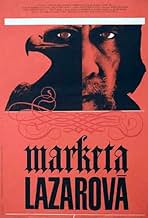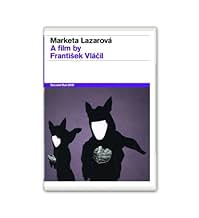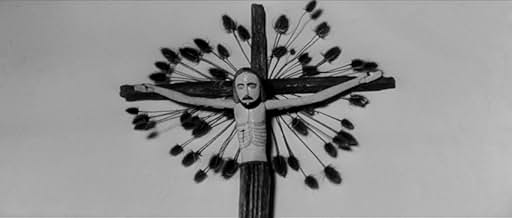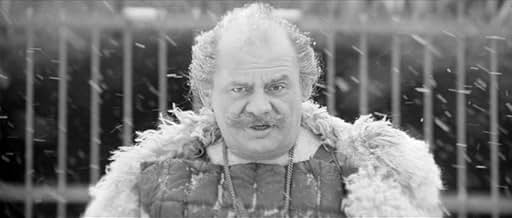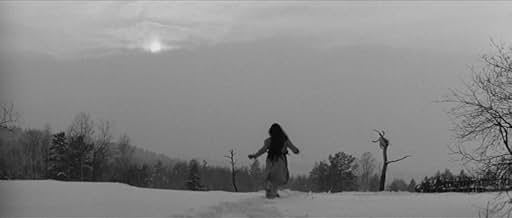NOTE IMDb
7,8/10
6,5 k
MA NOTE
Un portrait sombre du passage du paganisme au christianisme dans la Tchécoslovaquie médiévale où une jeune vierge promise à Dieu est enlevée et violée par un maraudeur que son père pieux che... Tout lireUn portrait sombre du passage du paganisme au christianisme dans la Tchécoslovaquie médiévale où une jeune vierge promise à Dieu est enlevée et violée par un maraudeur que son père pieux cherche alors à tuer en représailles.Un portrait sombre du passage du paganisme au christianisme dans la Tchécoslovaquie médiévale où une jeune vierge promise à Dieu est enlevée et violée par un maraudeur que son père pieux cherche alors à tuer en représailles.
- Réalisation
- Scénario
- Casting principal
- Récompenses
- 2 victoires et 2 nominations au total
Avis à la une
I bought the Second Run DVD, after reading about how this epic was considered the best Czech film, ever.
To be honest, not many other contenders spring to mind. And, who voted? As it was on special offer and I am a sucker indeed for that Russian style of gritty monochrome composition and beauty, how could I resist?
I'm on its second play and I'm no nearer following the story. There is undoubtedly one. Am I too overawed by imagery that I could only dream of? (even if I were able to!) Is it the savagery and feel of a certain reality?
I don't know. I can sense, however, an art film made with passion and unbounded imagination. Of folklore, both in a historical sense and a cultural one and of religious rebellion. Like Kurosawa at his best, an immediacy and connection. Yet, it is also dreamlike and distant, with an air of mysticism that I found increasingly confusing. The length of film means that by halfway through I've no idea what is going on, but am still enjoying what I see.
Unfortunately, I have docked a mark for the forced, electronically induced echo on the dialogue that probably is supposed to denote that other worldly strangeness. It seems to seep in and hang about, its constant use here cheapens the effect to being a bit of a pain. Whereas Kurosawa used that SFX so effectively on, say Roshomon, by using just once or twice.
I could see elements of the Brazilian 'Black God, White Devil' and like others have commented, Kurosawa's 'Seven Samurai' and Tarkov's 'Andrei Rublev'. Maybe some of the black magic in Bergman's late medieval classics, such as 'The Virgin Spring' and 'The Seventh Seal'. But more psychotic, more manic and disturbing than all these put together. Like madness itself, there is a real beauty deeply ingrained amongst the mayhem.
My conclusion would have to be that if you get the chance, go for it. Take it with a large pinch of salt and sprinkle sparingly. None of it is truly horrific or unpalatable to most adults and don't worry if you don't "get it". Be slightly proud and immodest that you've found a tarnished gem that hardly anyone else will have seen or are ever likely to.
To be honest, not many other contenders spring to mind. And, who voted? As it was on special offer and I am a sucker indeed for that Russian style of gritty monochrome composition and beauty, how could I resist?
I'm on its second play and I'm no nearer following the story. There is undoubtedly one. Am I too overawed by imagery that I could only dream of? (even if I were able to!) Is it the savagery and feel of a certain reality?
I don't know. I can sense, however, an art film made with passion and unbounded imagination. Of folklore, both in a historical sense and a cultural one and of religious rebellion. Like Kurosawa at his best, an immediacy and connection. Yet, it is also dreamlike and distant, with an air of mysticism that I found increasingly confusing. The length of film means that by halfway through I've no idea what is going on, but am still enjoying what I see.
Unfortunately, I have docked a mark for the forced, electronically induced echo on the dialogue that probably is supposed to denote that other worldly strangeness. It seems to seep in and hang about, its constant use here cheapens the effect to being a bit of a pain. Whereas Kurosawa used that SFX so effectively on, say Roshomon, by using just once or twice.
I could see elements of the Brazilian 'Black God, White Devil' and like others have commented, Kurosawa's 'Seven Samurai' and Tarkov's 'Andrei Rublev'. Maybe some of the black magic in Bergman's late medieval classics, such as 'The Virgin Spring' and 'The Seventh Seal'. But more psychotic, more manic and disturbing than all these put together. Like madness itself, there is a real beauty deeply ingrained amongst the mayhem.
My conclusion would have to be that if you get the chance, go for it. Take it with a large pinch of salt and sprinkle sparingly. None of it is truly horrific or unpalatable to most adults and don't worry if you don't "get it". Be slightly proud and immodest that you've found a tarnished gem that hardly anyone else will have seen or are ever likely to.
"Marketa Lazarova" was a film I saw in 1970 at a small film theater in Minneapolis, Minnesota. It left an indelible memory, and I've spent years trying to find a way to see it again. At least once a year, I find a note I left about a phone call I've made to some obscure library or other such place in the hope of finding a way to see it.
The film won an Academy Award, and it should be remembered. It is stunning in black and white; the story is remarkable in its content and direction.
If anyone has ideas about how we fans can possibly revive this movie, we should try to do so. It is worth all the trouble and more just to see it again and again.
The film won an Academy Award, and it should be remembered. It is stunning in black and white; the story is remarkable in its content and direction.
If anyone has ideas about how we fans can possibly revive this movie, we should try to do so. It is worth all the trouble and more just to see it again and again.
Some of the most rewarding film experiences I know of annotate the medium itself, oftentimes than not so elliptically it's almost impossible to see at first. I don't mean Fellini's "8 ½" (1963) or "F for Fake" (1974) and their ilk; these are explicitly self-referential films, not that there's anything wrong in that. The films I am referring to aren't really self-referentially about film on narrative level, rather about something else entirely; they become film allegories by extension, as if in the periphery, accidentally.
"Marketa Lazarová" (1967), so audaciously otherworldly, is a film like that. I've seen it twice now, and slowly it's starting to reveal its riches. The first time around my expectations misled me to approach it as something closer to Tarkovsky's "Andrei Rublev" (1966), and while there are similarities, the film is so radical it's not that fitting a comparison in my mind.
The backdrop for the film is a profound historical and cultural paradigm shift where Christianity and paganism battle it out. Two opposites, the film can be seen as a poetic exploration of this struggle, and thus as a social document. While interesting, something else speaks to me more. For me the two allegorical forces at play are those of image and sound, and their use in film world, in filmic language. They often go their own ways, images showing us something and the narration swerving to somewhere else altogether, and the complex array of characters and their unorthodox introduction and presentation in the film underline the effect of confusion very powerfully. The overdubbed, echoing dialogue, often out of sync with the image, distracted me on first viewing, but it's unmistakably fitting in the grand scheme of things. Some images are so powerful I can't get them out of my mind (not that I'd want to, mind you!)
And the music! It's the highest compliment I can think of when I say for a film so visually rich that you should not only see it but listen to it. Liska's contribution to the film in some ways contributes to the modest thesis I've been trying to form in so short a space, that is the wonderful interplay of sound and image. Kieslowski's "Trois couleurs: Bleu" (1993) might compare if I wanted to search for something as equally stunning as this.
And I can't write about the film without mentioning the most wonderful sound I've come across in film. It's the convent bell, and one can hear it towards the very beginning, during the revelation and just before the intertitles, I think, and I think it's repeated at least once later on.
All in all, what an experience. We're lucky to have two Blu-rays of the film, the first a Czech Region B, the second a Criterion Region A release. The first one does have English subtitles.
"Marketa Lazarová" (1967), so audaciously otherworldly, is a film like that. I've seen it twice now, and slowly it's starting to reveal its riches. The first time around my expectations misled me to approach it as something closer to Tarkovsky's "Andrei Rublev" (1966), and while there are similarities, the film is so radical it's not that fitting a comparison in my mind.
The backdrop for the film is a profound historical and cultural paradigm shift where Christianity and paganism battle it out. Two opposites, the film can be seen as a poetic exploration of this struggle, and thus as a social document. While interesting, something else speaks to me more. For me the two allegorical forces at play are those of image and sound, and their use in film world, in filmic language. They often go their own ways, images showing us something and the narration swerving to somewhere else altogether, and the complex array of characters and their unorthodox introduction and presentation in the film underline the effect of confusion very powerfully. The overdubbed, echoing dialogue, often out of sync with the image, distracted me on first viewing, but it's unmistakably fitting in the grand scheme of things. Some images are so powerful I can't get them out of my mind (not that I'd want to, mind you!)
And the music! It's the highest compliment I can think of when I say for a film so visually rich that you should not only see it but listen to it. Liska's contribution to the film in some ways contributes to the modest thesis I've been trying to form in so short a space, that is the wonderful interplay of sound and image. Kieslowski's "Trois couleurs: Bleu" (1993) might compare if I wanted to search for something as equally stunning as this.
And I can't write about the film without mentioning the most wonderful sound I've come across in film. It's the convent bell, and one can hear it towards the very beginning, during the revelation and just before the intertitles, I think, and I think it's repeated at least once later on.
All in all, what an experience. We're lucky to have two Blu-rays of the film, the first a Czech Region B, the second a Criterion Region A release. The first one does have English subtitles.
The film's reputation very well precedes it; in the first moment that I learned of 'Marketa Lazarová,' I also learned it's regarded as perhaps the best Czech movie ever made. I can appreciate why - I'm not familiar with the novel the movie is adapted from, but the story is exquisite. The narrative is as bleak as it is expertly crafted, and deeply engrossing. There's strong attention to detail in all things - every shot, every article of the costume design, every sight of set design, and eye-catching filming locations. The vivid imagery of a historical drama becomes ever more stark captured in black and white, including the countenances of the actors. The assembled cast is outstanding - all those most prominent before the camera, of course (Magda Vásáryová above all, embodying the all-important title role with all due gravity) but even those in supporting roles, realizing every vivid emotion and tribulation. Factor in many extras as well, and the landscape of medieval Europe seems dazzlingly real and tangible.
However - for as superb as the narrative is, and for as excellent as the picture is as a whole, I cannot say it's perfect. I have a rather difficult time engaging with the film at points, especially in the first half. The presentation of the story is disjointed: some story beats, or facets of each plot point that would round them out, are not expressed clearly, or at all. There is a substantial amount of narrative that does not play out before the camera, or dialogue that is spoken by figures who are not on-screen, and the audience is left to pick up the pieces and discern what they may. Fine as the tale is, it's extremely difficult to truly parse it without an outside synopsis to provide the context and clarification that the feature does not. For all the characters that are introduced, and given plenty of attention at varying points, the fates of some are left vague. The end result is that 'Marketa Lazarová' comes off not just as historical fiction, but an art film ruthlessly indifferent to conventional narrative flow.
To be clear, I think this is a great, grand film. The story it tells is magnificent in and of itself, and complex, even as it's terribly grim. All technical aspects are fantastic, including the direction; the cast is swell; the writing, broadly, is marvelous. Some sequences are truly exceptional - outright phenomenal - particularly nearer the end. But there are also many ponderous gaps in the plot progression, and otherwise instances of inelegant telling, that gravely stymie the absolute mastery of cinema that the feature could and should have represented save for those faults. That 'Marketa Lazarová' nonetheless succeeds in being so splendid a work despite its flaws is a testament to the skills of all involved, but the deficiencies are unfortunate all the same.
The content is oppressively dreary, and the execution as a whole has no few problems. Still, for all that: the immense quality, from start to finish, manages to well outweigh the issues of its rendering. I think this is a superlative example of what cinema can achieve that deserves far greater renown outside the Czech Republic; would only that the blemishes could have been cleared up. For many reasons this won't be a film that everyone can enjoy, but if one can look past the sometimes laborious effort that the viewing experience represents, I dare say this is essential. Though regrettably imperfect, 'Marketa Lazarová' is a captivating, striking exemplar of film that earns my most hearty recommendation, and it's very much worth watching by whatever means one is able.
However - for as superb as the narrative is, and for as excellent as the picture is as a whole, I cannot say it's perfect. I have a rather difficult time engaging with the film at points, especially in the first half. The presentation of the story is disjointed: some story beats, or facets of each plot point that would round them out, are not expressed clearly, or at all. There is a substantial amount of narrative that does not play out before the camera, or dialogue that is spoken by figures who are not on-screen, and the audience is left to pick up the pieces and discern what they may. Fine as the tale is, it's extremely difficult to truly parse it without an outside synopsis to provide the context and clarification that the feature does not. For all the characters that are introduced, and given plenty of attention at varying points, the fates of some are left vague. The end result is that 'Marketa Lazarová' comes off not just as historical fiction, but an art film ruthlessly indifferent to conventional narrative flow.
To be clear, I think this is a great, grand film. The story it tells is magnificent in and of itself, and complex, even as it's terribly grim. All technical aspects are fantastic, including the direction; the cast is swell; the writing, broadly, is marvelous. Some sequences are truly exceptional - outright phenomenal - particularly nearer the end. But there are also many ponderous gaps in the plot progression, and otherwise instances of inelegant telling, that gravely stymie the absolute mastery of cinema that the feature could and should have represented save for those faults. That 'Marketa Lazarová' nonetheless succeeds in being so splendid a work despite its flaws is a testament to the skills of all involved, but the deficiencies are unfortunate all the same.
The content is oppressively dreary, and the execution as a whole has no few problems. Still, for all that: the immense quality, from start to finish, manages to well outweigh the issues of its rendering. I think this is a superlative example of what cinema can achieve that deserves far greater renown outside the Czech Republic; would only that the blemishes could have been cleared up. For many reasons this won't be a film that everyone can enjoy, but if one can look past the sometimes laborious effort that the viewing experience represents, I dare say this is essential. Though regrettably imperfect, 'Marketa Lazarová' is a captivating, striking exemplar of film that earns my most hearty recommendation, and it's very much worth watching by whatever means one is able.
Just wanted to add a note about the apparent slightly negative comments about the visual quality of the Second Run DVD release - well, how petty can you get! This astonishing film is incredible to look at and is surely one of the most beautiful films ever made though not, it has to be said, in a conventional sense. Although some scenes feature genuinely authentic brutality, there is a strange dream-like quality to the film's look. The story itself demands total concentration throughout but, by the end, you will be fully rewarded for your efforts. A poetic masterpiece. Great work again by Second Run for making such a cinematic rarity available to view.
Le saviez-vous
- AnecdotesFrantisek Vlácil not only had the clothes painstakingly researched and hand-sewn, he had the cast live in the forest for the two years of shooting so they could get into the 13th century mindset.
- GaffesIn a scene where Marketa observes a reindeer in the forest, you can see a director Frantisek Vlácil in jacket in the left of the frame. He was actually trying to scare deer, because they didn't want to move. This could be seen only on some of the Blu-Ray and DVD versions.
- Versions alternativesThe UK release was cut, a cut was required to remove sight of a snake being stabbed and rearing up in pain, in order to obtain a 15 classification. The cut was made on the basis of BBFC policy on genuine animal cruelty. An uncut classification was not available.
- ConnexionsEdited into CzechMate: In Search of Jirí Menzel (2018)
Meilleurs choix
Connectez-vous pour évaluer et suivre la liste de favoris afin de recevoir des recommandations personnalisées
- How long is Marketa Lazarová?Alimenté par Alexa
Détails
- Durée
- 2h 42min(162 min)
- Couleur
- Mixage
- Rapport de forme
- 2.35 : 1
Contribuer à cette page
Suggérer une modification ou ajouter du contenu manquant

![Regarder Trailer [OV]](https://m.media-amazon.com/images/M/MV5BOGZhMmFmMGQtNGZhMi00M2QzLWExMjItZjJkZTVhMmEzYzJjXkEyXkFqcGdeQXRyYW5zY29kZS13b3JrZmxvdw@@._V1_QL75_UX500_CR0)
